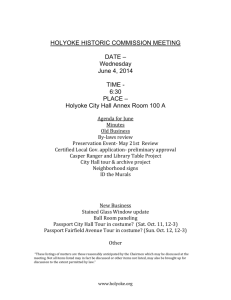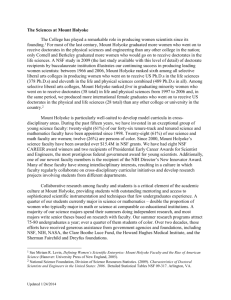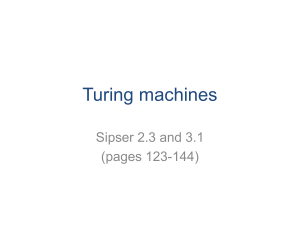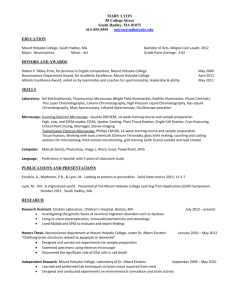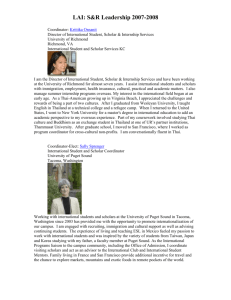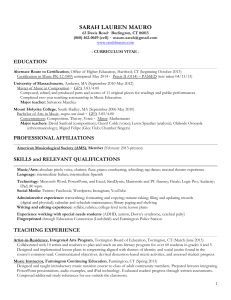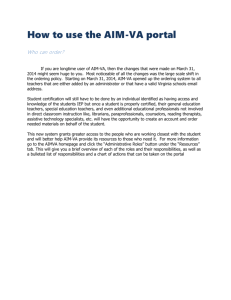Experiencing Madness Film Series
advertisement
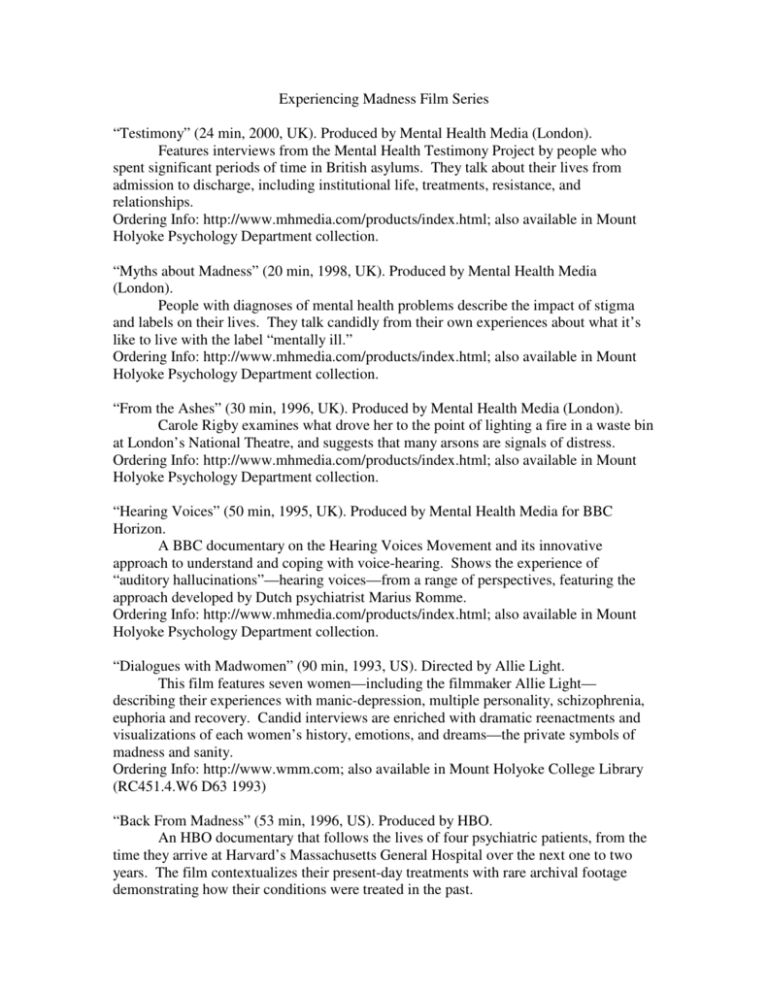
Experiencing Madness Film Series “Testimony” (24 min, 2000, UK). Produced by Mental Health Media (London). Features interviews from the Mental Health Testimony Project by people who spent significant periods of time in British asylums. They talk about their lives from admission to discharge, including institutional life, treatments, resistance, and relationships. Ordering Info: http://www.mhmedia.com/products/index.html; also available in Mount Holyoke Psychology Department collection. “Myths about Madness” (20 min, 1998, UK). Produced by Mental Health Media (London). People with diagnoses of mental health problems describe the impact of stigma and labels on their lives. They talk candidly from their own experiences about what it’s like to live with the label “mentally ill.” Ordering Info: http://www.mhmedia.com/products/index.html; also available in Mount Holyoke Psychology Department collection. “From the Ashes” (30 min, 1996, UK). Produced by Mental Health Media (London). Carole Rigby examines what drove her to the point of lighting a fire in a waste bin at London’s National Theatre, and suggests that many arsons are signals of distress. Ordering Info: http://www.mhmedia.com/products/index.html; also available in Mount Holyoke Psychology Department collection. “Hearing Voices” (50 min, 1995, UK). Produced by Mental Health Media for BBC Horizon. A BBC documentary on the Hearing Voices Movement and its innovative approach to understand and coping with voice-hearing. Shows the experience of “auditory hallucinations”—hearing voices—from a range of perspectives, featuring the approach developed by Dutch psychiatrist Marius Romme. Ordering Info: http://www.mhmedia.com/products/index.html; also available in Mount Holyoke Psychology Department collection. “Dialogues with Madwomen” (90 min, 1993, US). Directed by Allie Light. This film features seven women—including the filmmaker Allie Light— describing their experiences with manic-depression, multiple personality, schizophrenia, euphoria and recovery. Candid interviews are enriched with dramatic reenactments and visualizations of each women’s history, emotions, and dreams—the private symbols of madness and sanity. Ordering Info: http://www.wmm.com; also available in Mount Holyoke College Library (RC451.4.W6 D63 1993) “Back From Madness” (53 min, 1996, US). Produced by HBO. An HBO documentary that follows the lives of four psychiatric patients, from the time they arrive at Harvard’s Massachusetts General Hospital over the next one to two years. The film contextualizes their present-day treatments with rare archival footage demonstrating how their conditions were treated in the past. Ordering Info: Distributed by Films for the Humanities and Sciences, PO Box 2053, Princeton, NJ 08543-2053. Telephone: (800) 257-5126; distributor website: www.films.com; also available in Mount Holyoke College Library (RC445.M43 C3 1996). “We Don’t Live Under Normal Conditions” (59 min, 2000, US). Produced by Fanlight Productions, directed by Rhonda Collins. This impassioned documentary looks at depression and mental illness as a societal problem, rather than merely as individual pathology. It challenges both psychiatric orthodoxy and the pharmaceutical industry, and demands that we focus, as well, on underlying social conditions as sources of emotional distress. Ordering Info: http://www.fanlight.com; email: orders@fanlight.com, order #: QA-296; telephone: 1-800-937-4113; also available in Mount Holyoke College Library (RC537.W4 2000). “Did you Used to be R.D. Laing?” (90 min, 1992, US). Directed by Tom Shandel and Kirk Tougas. Drawing on stories from Laing’s own life and from his patients’ experiences, and following him through a series of lectures and workshops, the film presents a portrait of the radical psychiatrist as an engaging, witty, and irreverent character. Ordering Info: http://www.directcinema.com/dcl/dcl_films.html; telephone: 310-6368200; also available in Mount Holyoke College Library (RC339.52.L34 D53 1992). “Between the Lines” (21 min, 1997, US). Directed and Produced by Sophia Constantinou. A visually lyrical, experimental documentary about women who cut themselves, this film explores the gray areas in women’s relationships to their bodies in the context of deliberately self-inflicted injury. The women portrayed negotiate the fine line between self-destructive behavior and self-preserving coping mechanisms. Ordering Info: http://www.fanlight.com; email: orders@fanlight.com, order #: QA-263; telephone: 1-800-937-4113; also available in Mount Holyoke College Library (RC552.S4 B48 1997) “The Dark Side of the Moon” (25 min, 1997, US). Directed by James and Tabitha Mulryan. This moving documentary weaves together the stories of three mentally disabled men, formerly homeless, who have overcome despair, stigma, and isolation to become valued members of their community. Ordering Info: http://www.fanlight.com; email: orders@fanlight.com, order #: QA-234; telephone: 1-800-937-4113; also available in Mount Holyoke College Library (HV3009.D35 1997). “What About Bob?” (99 min, 1991, US). Directed by Frank Oz. Bob (Bill Murray) is a lovable patient who follows his uptight psychiatrist (Richard Dreyfuss) to his vacation home in New Hampshire. Bob quickly endears himself to the doctor’s family but slowly drives his psychiatrist completely mad. The film is a humorous exploration of complex issues of mental health and illness. Ordering Info: amazon.com; movies.com; imdb.com; also available in Mount Holyoke Psychology Department collection. “Family Life” (108 min, 1971, UK). Directed by Ken Loach. The politically charged and deeply affecting story of an emotionally fragile teenaged girl (Sandy Ratcliff) torn between the demands of her socially conservative parents and the indifferent doctors and hospital staff charged with treating her. Reviewers hailed its “raw and finely nuanced performances,” calling it “an unforgettable human drama…the perfect antidote to Hollywood’s mindless depiction of the mentally ill.” Ordering Info: amazon.com; imdb.com; buyindies.com; also available in Mount Holyoke Psychology Department collection. “Fear Strikes Out” (100 min, 1957, US). Directed by Robert Mulligan. The courageous true story of Red Sox outfielder Jimmy Piersall (Anthony Perkins), who breaks down under the constant pressures imposed by his hard-driving, overbearing father (Karl Malden). Piersall manages to overcome catatonia and return to the major leagues, batting a .272 average over 17 seasons. A powerful, inspring story of determination and resilience. Ordering Info: amazon.com; imdb.com; http://homevideo.paramount.com/index.jsp “What Women Want” (30 min, 2002, UK). Produced by Mental Health Media (London). This film features powerful stories from women who have experienced serious mental health problems, giving insight from the perspective of the women themselves into such issues as sexual abuse, self-harm, and motherhood. It highlights examples of positive mental health services, and can help organizations review their policies and practices. Ordering Info: http://www.mhmedia.com/products/index.html; also available in Mount Holyoke Psychology Department collection. “Insight in Mind” (25 min, 2000, UK). Produced by Mental Health Media (London). This film vividly demonstrates how it feels to experience the highs and lows of moods commonly associated with “manic depression.” The film takes the viewer on an emotional journey with the use of poetry, film, photography, animation, and music. These 14 poetic pieces are interwoven with the voices of survivors talking openly about their experiences alongside images representing them. Ordering Info: http://www.mhmedia.com/products/index.html; also available in Mount Holyoke Psychology Department collection. “An Anorexic’s Tale: The Brief Life of Catherine” (80 min, 1987, US). Produced by Films for the Humanities and Sciences. This docudrama tells the story of Catherine Dunbar’s seven-year battle for life in the fight against anorexia. Based on the story told by her mother and her own diaries, it traces Catherine’s downward spiral from the age of 15, when a lively and attractive teen became obsessed by her weight, went on binges, became addicted to laxatives—and despite desperate efforts from many sides, died weighing an incredible 40 pounds. Ordering Info: Distributed by Films for the Humanities and Sciences, PO Box 2053, Princeton, NJ 08543-2053; telephone: (800) 257-5126; distributor website: http://www.films.com; also available in Mount Holyoke College Library (RC552.A5 A567 2003). “Shock Therapy: The Last Resort” (49 min, 2001, US). Produced by Film Garden Entertainment, Inc. for Discovery Channel. Advocates of shock treatment cite an efficacy rate better than any anti-depressive drug on the market; detractors say it is a form of head trauma. This film offers a balanced look at electroconvulsive therapy, or ECT. While following the ongoing treatments of a 30-year old mother of two, the program provides interviews with people on both sides of the issue, such as Dr. Peter Breggin, a psychiatrist and an outspoken critic of ECT, ECT survivors who say their lives have been damaged by the procedure, and Roland Kohloff, the New York Philharmonic’s chief timpanist, who claims ECT saved both his life and his son’s life. Ordering Info: Distributed by Films for the Humanities and Sciences, PO Box 2053, Princeton, NJ 08543-2053; telephone: (800) 257-5126; distributor website: http://www.films.com; also available in Mount Holyoke College Library (RC485.S56 2002). “West 47th Street” (83 min, 2002, US). Directed by Bill Lichtenstein and June Peoples. This documentary follows four people diagnosed with mental illness—off the streets and out of the homeless shelters, in and out of the hospital, at home and at work— over three years. The film offers a window on the lives of people who are often feared or ignored but seldom understood, and focuses on their resilience, optimism and grace. Those featured are members of Fountain House in New York City. Some have hailed this film as a powerful community and educational outreach tool for combating stigma, which remains the largest single barrier to successful treatment of and recovery from mental illness. Others criticize the ways the film was edited to highlight the role of mental health professionals and downplay survivor-run alternatives. Ordering Info: http://www.LCMedia.com; telephone: 800-PLAY-PBS; also available in Mount Holyoke Psychology Department collection.
